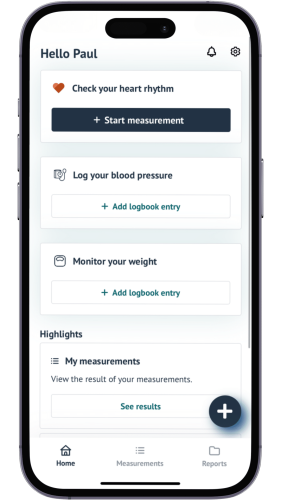At FibriCheck, our goal is to empower you to take control of your heart health. In addition to our heart rate and heart rhythm measurements, we also want to give you insights into key risk factors that can affect your heart. High blood pressure and excessive weight are two important contributors to the development of cardiovascular disease. That’s why last year, we introduced a feature enabling you to follow up on your blood pressure. With our latest app release, we’re excited to include a weight logging feature as well, to further support your heart health journey!
How can you keep track of your weight with FibriCheck?
Keeping track of your weight and your BMI can easily be done with FibriCheck and can help you understand your risk of heart disease. With this new feature, you’ll be able to enter your weight values in the FibriCheck app. Your BMI will then automatically be calculated and categorized, which gives you immediate insights into your health. You can find more information on how to use this feature in our FAQs.

As always, you can easily share your results with your physician, so that they can quickly gain extensive insights into your cardiovascular risk profile.
Disclaimer: your results are not automatically followed up by your healthcare provider. Contact your physician for more information.
What is the link between your weight and your heart health?
Maintaining a healthy weight is crucial for your heart health because excessive body weight significantly increases the risk of developing cardiovascular disease. Excess fat, especially around your belly, is linked to elevated blood pressure, higher cholesterol levels, and insulin resistance, all of which contribute to heart disease. Over time, being overweight also causes the heart to work harder, which leads to increased strain on your heart and blood vessels and the risk of developing heart rhythm conditions such as atrial fibrillation.
Weight is also an important factor in the development and follow-up of heart failure, a heart disease affecting more than 64 million people worldwide. By tackling excessive weight, patients suffering from heart failure may improve their symptoms and increase their exercise capacity.
What is BMI and why is it important?
Body Mass Index (BMI) is a widely used measurement that helps assess whether your weight is within a healthy range based on your height. Calculated by dividing your weight in kilograms by your height in meters squared (kg/m²), BMI provides a simple value that falls into categories such as underweight, normal weight, overweight, and obesity.
BMI is an important screening tool because a high BMI can indicate an increased risk of developing serious conditions such as heart disease, stroke, heart rhythm conditions, and type 2 diabetes.
Monitoring BMI is a valuable part of maintaining overall health and can guide you and your healthcare provider in making informed decisions about lifestyle and treatment options. Your BMI value places you in a certain category that gives an indication about your overall health:
| Underweight | You are considered underweight if your BMI is less than 18.5 kg/m². |
| Normal weight | You are considered to have a normal weight if your BMI is between 18.5 and 24.9 kg/m². This is a healthy BMI. |
| Overweight | You are considered overweight if your BMI is between 25 and 29.9 kg/m². Being overweight is a major determinant of diseases. |
| Obesity | You are considered obese if your BMI is equal to or greater than 30 kg/m². Being obese increases your risk of diseases significantly. |
Can’t wait to get started? Try the new feature out right away!
*note: this feature is only available in Europe.
References
https://pubmed.ncbi.nlm.nih.gov/35150240/
https://www.ahajournals.org/doi/full/10.1161/CIR.0000000000000973
https://www.cdc.gov/heart-disease/risk-factors/index.html
https://academic.oup.com/eurheartj/article/42/36/3599/6358045?login=false#305162822
https://www.heart.org/en/healthy-living/healthy-eating/losing-weight/bmi-in-adults
Created on August 29th, 2024 at 03:18 pm
Last updated on October 14th, 2024 at 12:40 pm



